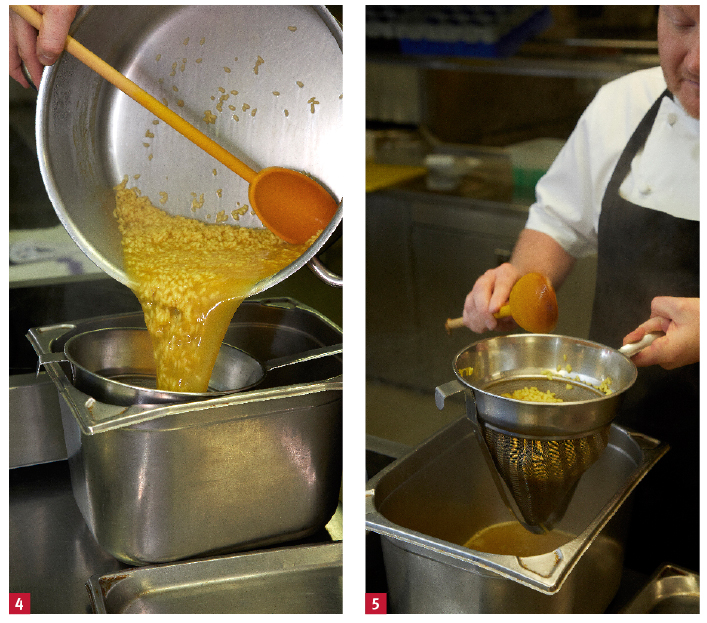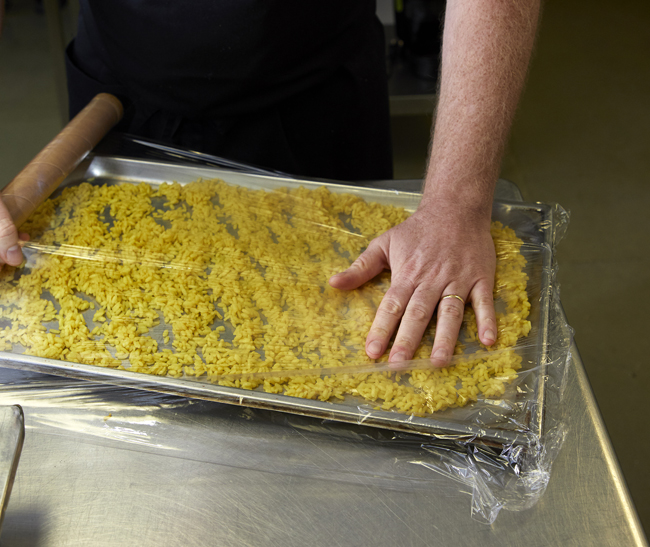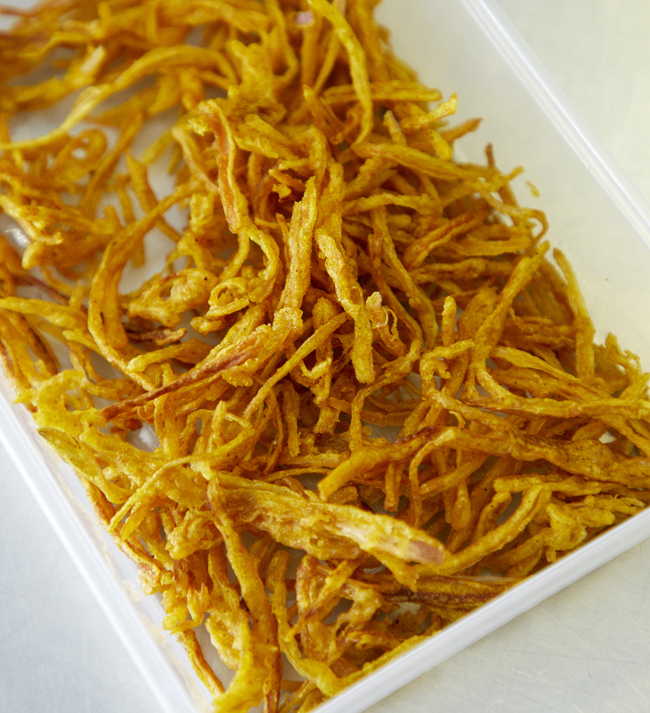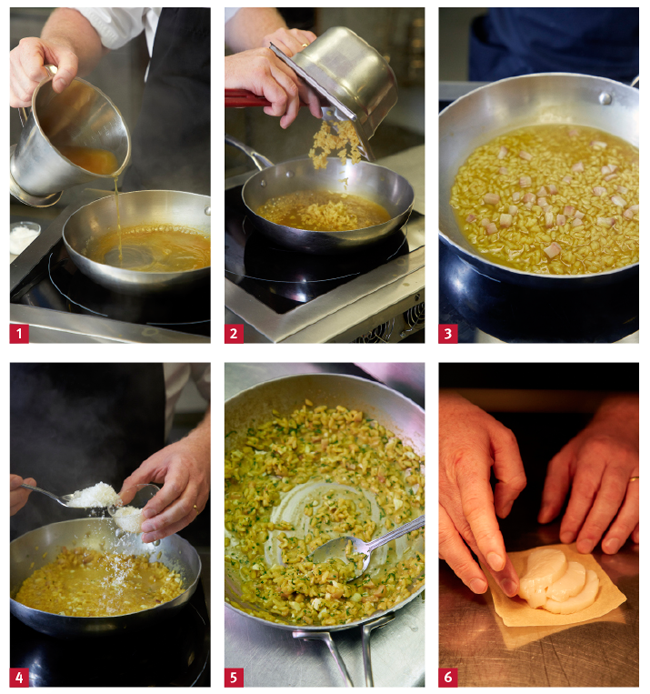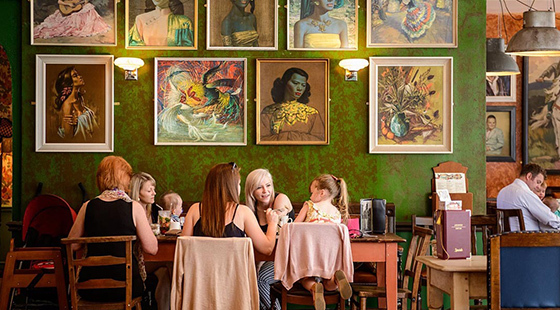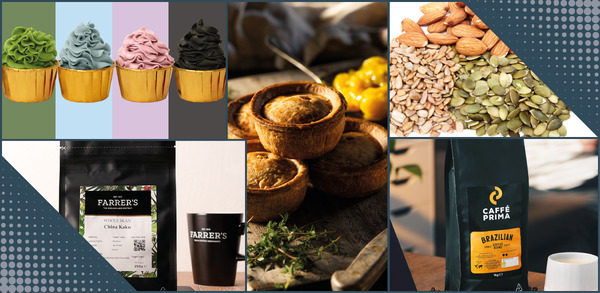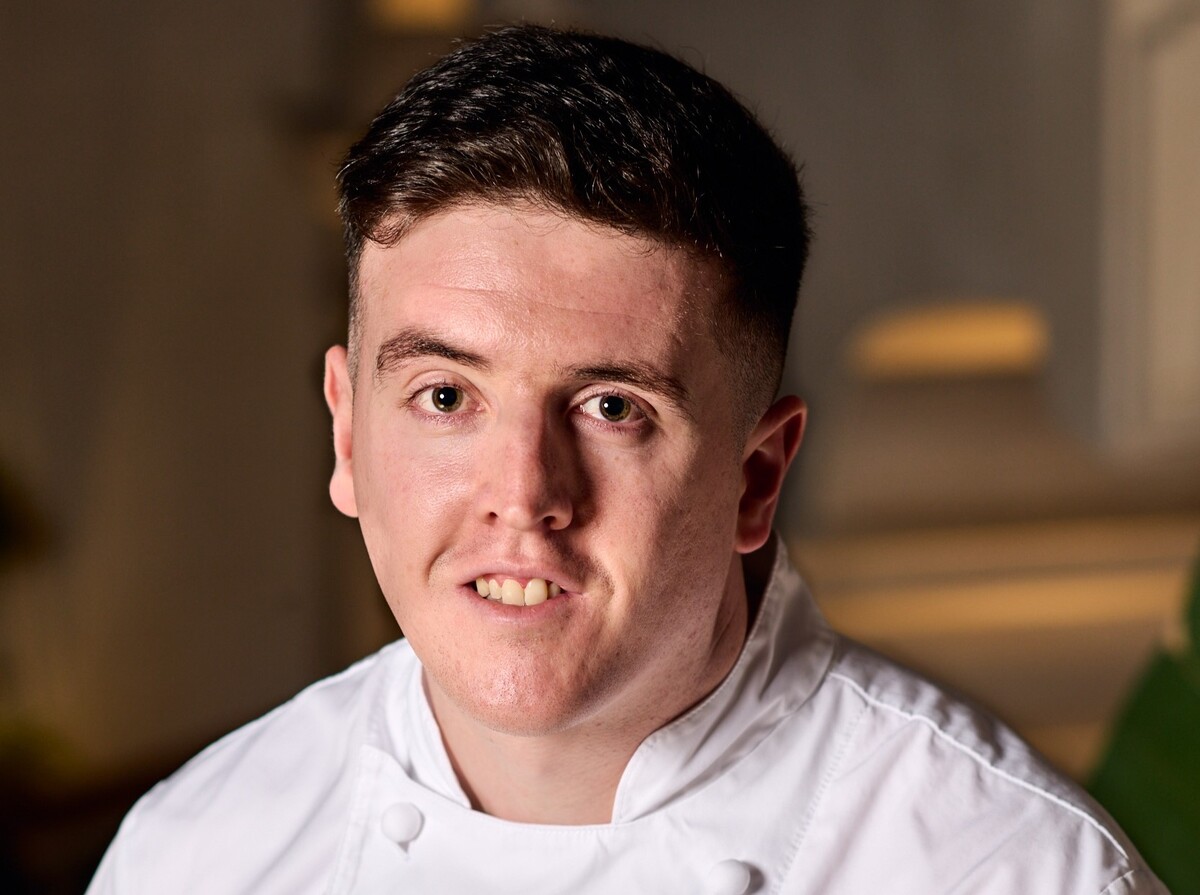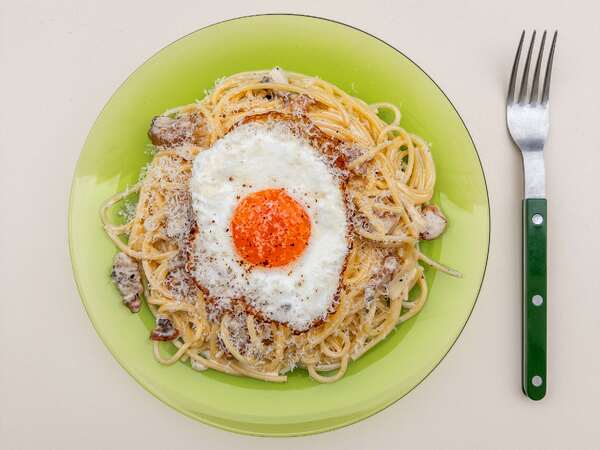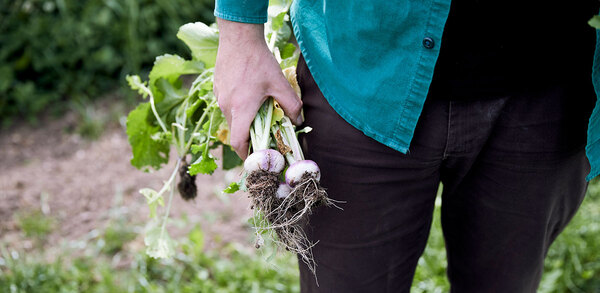Masterclass: The Goring's kedgeree
Shay Cooper's take on a classic kedgeree has breathed new life into the Anglo-Indian favourite. Michael Raffael reports
No two kedgeree recipes are alike. Cooks have tinkered with this Anglo-Indian dish for the past 200 years, and even the mighty Escoffier included a cadgery de saumon (salmon kedgeree) in his Guide Culinaire. His version, a pilaf with flaked fish, curried béchamel and hard-boiled eggs, could pass muster today.
Shay Cooper's take at London's The Goring hotel draws on techniques both old and current to create a kedgeree far removed from the dish that would have graced the Downton Abbey breakfast table. His vialone nano rice (neither patna nor basmati) belongs to the risotto school of cookery. He references the haddock that most cooks think of as a key ingredient with a haddock-based stock. For fish he opts for smoked eel and a raw scallop topping. Instead of a sauce or cream, he prefers a curry-flavoured oil and compound butter.
The biggest difference, though, is that it's a delicate starter rather than a plate-filler. Its overall taste remains faithful to the concept of the original, but it's lighter and loaded with layers of flavour, ditching its ‘traditional English cooking' tag and graduating to the fine-dining table.
Planning • Make batches of the curry oil and the compound butter
• Fry the shallots
• Make the smoked haddock stock for the rice
• Parboil and blast-chill the rice (made daily)
• Marinate the trout caviar
• Finish the rice and assemble the kedgeree à la minute during service.
Cost Orkney scallop kedgeree is on both the £52 lunch and £64 dinner menus at the Goring. The biggest part of the cost comes from the diver scallop (about £2 a piece), but the dish still meets Cooper's 70% gross profit target.
Compound butter
Blend 1.5kg unsalted butter with six finely diced shallots, six garlic cloves, the grated zest of two lemons, 60g chopped coriander stalks, 30g ground coriander and 100g curry powder.
Curry oil Caramelise two diced onions in 50ml rapeseed oil. Add two star anise, 15 coriander seeds, one cinnamon stick, five green cardamom seeds, 80g ginger, a bulb of garlic and 50g of mild curry powder to the pan. Pour over extra virgin rapeseed oil to cover (about a litre) and hold at 65°C for four hours. Strain the oil through muslin and transfer to squeezy bottles.
Smoked haddock stock Makes 3 litres (about 20 starter portions)
40g mild curry powder, eg for korma
1 cinnamon stick
5g saffron
70g peeled and chopped ginger
2 stalks lemon grass
100g sliced onion
1tsp black peppercorns
1tsp white peppercorns
1tsp coriander seeds
1 star anise
1 sliced garlic clove
5g Maldon salt
3 litres water
1kg undyed haddock
Coriander stalks
Bring all the ingredients bar the haddock and coriander stalks to the boil. Take off the heat and allow to infuse. Strain through a fine chinois or muslin.
Pour into a clean pan with the haddock and coriander. Cover with film. Bring to the boil and simmer 12 minutes. Strain and reserve.
To par-cook the rice Makes 15-20 starter servings
2.5-3 litres haddock stock
250g vialone nano rice
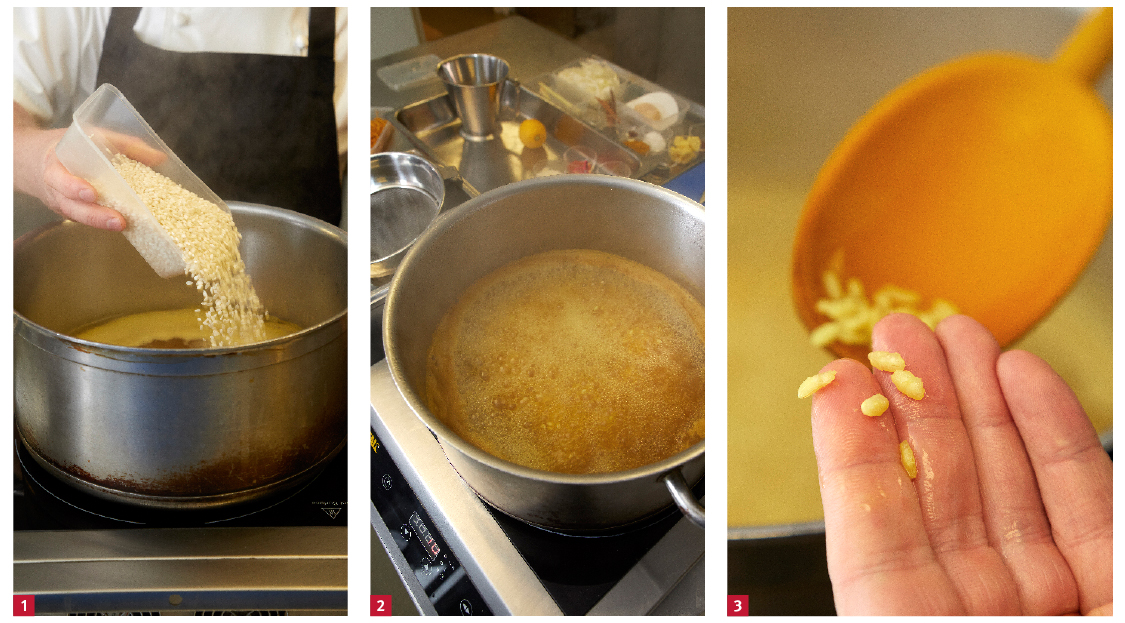
Strain the boiled rice (4-5), spread it out in a thin layer on a gastronorm tray and then chill it. Chill and reserve the broth to help emulsify the rice during service.
Pickled trout caviar
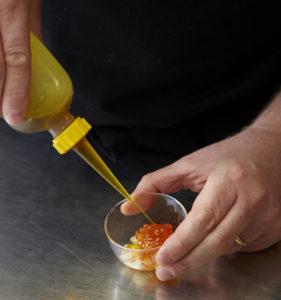
30g caster sugar
50ml white wine vinegar
100g tomato water (blitzed ripe tomatoes, hung and passed through a muslin)
100g trout roe
Dissolve the salt and caster sugar in the white wine vinegar and tomato water. Stir the trout caviar into the liquid and leave to marinate for 20 minutes.
Crisp-fried shallots in bhaji batter Bhaji batter for two large banana shallots (scale up as necessary)
Prepare a batter with 200g gram flour, 6g turmeric, 20g curry powder, 30g ginger juice, 10ml lemon juice, 12g salt and 360ml cold water.
Shred two large banana shallots into julienne. Preheat the fryer to 160°C. Dip the shallots into the batter and fry them a few at a time until crisp, ensuring they donât stick together. Drain on absorbent paper and store in an airtight container.
Orkney scallop, kedgeree, shiso, lime Serves 1
120ml haddock stock
1 heaped tbs par-cooked rice
25g compound butter
Squeeze of lemon juice
10g Parmesan
25g smoked eel, cubed (large brunoise dice)(see note)
1tsp hard-boiled egg white, chopped
1tsp herbs (coriander, dill and chives), chopped
1 scallop, sliced
2tsps curry oil
10 strands crisp-fried shallot (see panel, page 33)
Trout caviar
Finger lime
Shiso and coriander micro-leaves
Heat the stock in a small sauté pan (1). When it boils, rain in the rice (2). Cook like a risotto until all the liquid is absorbed and it is just tender. Stir in the compound butter (3). Add a squeeze of lemon juice and fold in the Parmesan, smoked eel, egg white and herbs (4-5).
Put the sliced scallop on a square of silicone paper and warm it through under the lights on the pass (6).
To assemble: spoon a mound of the kedgeree in the middle of a serving dish. Lay the scallop on top. Squeeze the curry oil around the base. Decorate with the shallots, a few beads of trout caviar, a hint of finger lime and the micro-leaves.
Note Instead of the smoked eel, Cooper has previously served the flaked haddock from the broth.
Kedgereeâs evolving story
1845 Eliza Acton gives a version where the rice is cooked âas for currieâ, mixed with lightly scrambled eggs and fish. In a footnote she adds that the best kedgeree is made with smoked haddock.
1899 Mrs Beeton, the queen bee, gives three variants, including a meat one, and Auguste Escoffier, the king of chefs, chooses salmon. Charles Herman Senn (author of Recherché Side Dishes) describes two variations: the first à lâindienne with dessicated coconut, the second with a maître dâhotel sauce dished up on toast.
1940 André Simonâs A Concise Encyclopaedia of Gastronomy has a dish with boiled rice, one part smoked haddock to two parts flaked white fish (cod, halibut or hake), crumbled hard-boiled egg and cream.
1970s TV presenter and expert on English cookery Michael Smith suggests tinned salmon as an alternative to haddock and recommends a creamy mushroom and curry sauce.
Post-millennium Every media chef gets in on the act. Jamie Oliver goes for brown rice and poached eggs, Nigel Slater swaps rice for pearl barley and smoked mackerel for haddock, and Nadiya Hussainâs cumin, coriander and garam masala version takes the dish back to its Indian roots, bar the hot-smoked salmon that she recommends.
Shay Cooper
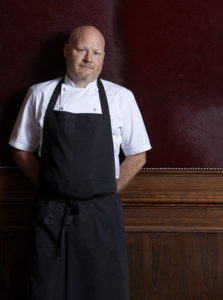
Itâs a lesson Cooper took with him, first to the Bingham in Richmond and, for the last four years, to The Goring. When he joined Londonâs oldest family-owned hotel, he received a strict brief: he wasnât being employed to win accolades; his role was to improve things without alienating the traditional customer base. He would become a member of an institution that was greater than any of its individual parts. Jeremy Goring wasnât hiring him to carry out a culinary revolution.
Since taking over, Cooper has met those parameters. The lobster omelette, roast beef from the trolley, grilled Dover sole and trifle on the lunch menu are flourishing, but for the first time in its history the Dining Room has a Michelin star.
Cooper has added an extra dimension without rocking the proverbial boat: âIf you are sensitive about how you write a menu and present it in a way that is familiar and doesnât scare customers, thereâs every chance that if a dish is well balanced and the portion is right, they will enjoy it. If you want to instigate change, be patient.â
The Dining Room, with its strong retro identity, has always done well at lunch, and fish pie and steak and kidney pudding still figure among the daily dishes. Most guests donât want to linger and there isnât so much as a hint of the dégustation menu. However, thereâs no shortage of choice: the classics are interwoven with Cooperâs own dishes.
Although the dinner menu seems similar,in the evenings the atmosphere changes andit becomes a destination restaurant. Hotel guests who in the past would have dined out often dine in now. Without undermining The Goringâs core values, Cooper believes he has enhanced the hotelâs offer.
âInitially, taking on the weight of tradition here was a little daunting, but once I accepted it, it was clear how to approach it. At this point Iâm proud of what weâve achieved. The restaurant is very busy and the food is well received.â



